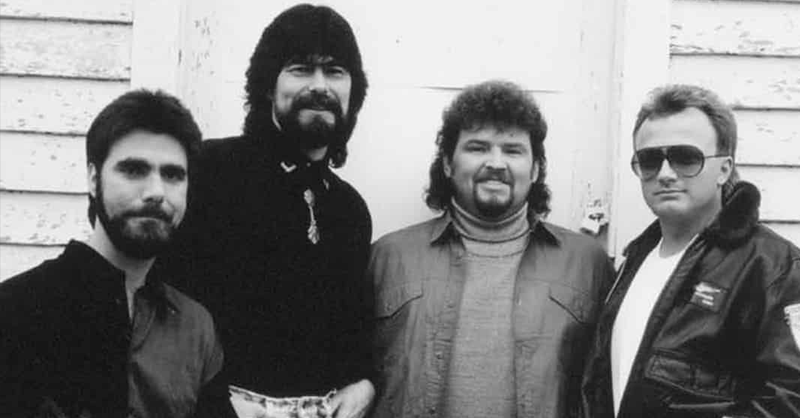About the artists

Gentry, Owen, and Cook are cousins all born in Fort Payne, Alabama. The cousins formed a band called Wildcountry. From 1973 to 1977, Wildcountry worked shows across the South, spreading their blend of southern rock and country-pop to the masses. In 1977, Wildcountry renamed itself to Alabama. In 1979, the band hired rock and roll drummer Herndon on a permanent basis. The band quickly gained momentum in the country music industry. During the 1980s and 1990s, they produced 21 consecutive #1 singles. “If You’re Gonna Play In Texas” was the 14th consecutive #1 single, released in 1984.
Lyrics and Discussion
Chorus
If you’re gonna play in Texas,
You gotta have a fiddle in the band.
That lead guitar is hot,
But not for “Louisiana man”.
So rosin up that bow for “faded love”
And let’s all dance.
If you’re gonna play in Texas,
You gotta have a fiddle in the band.
The fiddle is a staple instrument in Texan music. Alabama clearly pays tribute to this fact by saying that you must have a fiddle in your band if you plan to play in Texas. Additionally, the band comments on how people in Texas are partial to true Texan music. The “lead guitar” that is “hot” refers to the guitars that play music in Texas. These guitars will often play songs like “Faded Love” by Bob Wills, who is a native Texan and a very popular artist in Texas. However, the guitars will not play songs like “Louisiana Man” by Doug Kershaw, despite the fact that it features fiddling very heavily. This comparison shows how Texans show intense pride in their native musicians, regardless of whether or not non-native Texans use instruments that are often seen in Texan music.
Verses
I remember down in Houston
We were puttin’ on a show
When a cowboy in the back stood up and yelled,
“Cotton-Eyed Joe”!
He said, “we love what you’re doin’.
Boys don’t get us wrong,
There’s just somethin’ missin’ in your song.
So we dusted off our boots and put our cowboy hats on straight.
Them Texans raised the roof when Jeff opened up his case.
You say y’all all want to two-step. you say ya want to doe-si-doe.
Well, here’s a fiddlin’ song before we go.
Houston is one of the most well-known cities in Texas, especially in regard to its music. Additionally, this verse pays tribute to Texan mythology by referencing stereotypes of Texas, such as cowboys, boots, and cowboy hates and dances such as the Cotton-Eyed Joe, the two-step, and the do-si-do.
Distinctive Texan Sounds
Throughout the song, many distinctive Texan instruments and sounds can be heard.
- Drumset & guitar – Drumsets and guitars are often used in rock and roll music, and Alabama uses them to their advantage to blend rock and roll with classic country to produce a unique sound that still shares a Texan “feel”.
- Fiddle – As referenced throughout the song, fiddles are a staple instrument in Texan music and can distinguish a Texan country song from other country songs.
- Vocal tone – Since Gentry, Owen, and Cook were born and raised in Alabama, they have distinct Southern accents that can clearly be heard in the vocals of their songs. Southern accents are also prevalent throughout Texas and are often considered to be a defining feature of Texans.
- “Yee-haw!” – Often used in television and music, the “yee-haw!” is a stereotypical vocal representation of cowboys, which are stereotypically used to depict and represent Texas
- El grito – El grito is a distinctive yell or shout perfected by Mexican mariachi bands. It can be the ultimate expression that someone is having a good time. With such close geographical proximity to each other, Texan music is often influenced by the Mexican music just across the border.
Album Cover Controversy

Alabama, being a band from the deep south, has five original album covers that have depictions of the confederate flag on them. While this was not much of an issue in the 1980s when the albums were released, it has become an issue in recent years. “If You’re Gonna Play in Texas” came out on the album “Roll On.” As depicted above, this was one of the albums that had a revision. Teddy Gentry was quoted saying, “To me, Alabama (the state) was always looked at as the Heart of Dixie, and it had the rebel flag there… I never associated it with racism in any way. That was a symbol of the Old South, which I guess meant different thinks to different people. In our hearts, it meant, ‘This is where we’re from. We’re from Dixie.'” After concerns were raised about the confederate flag being on the album covers, the band replaced it with the United States flag or the Alabama state flag on much of their merchandise. The band’s manager, Tony Conway, said that the band has had a clause in their contracts for several years that forbade the use of the confederate flag in any marketing or promotional material. Spotify uses the revised cover in the band’s discography, however, Alabama continues to use the original, controversial cover on their website.
Sources
“Alabama.” Country Music Hall of Fame, https://www.countrymusichalloffame.org/hall-of-fame/alabama.
“Alabama.” The Official Website of the Alabama Band, https://www.thealabamaband.com/.
“Alabama – Discography.” Spotify, https://open.spotify.com/artist/6rJqqRce0Kvo2dJUXoHleC/discography/album.
Mansfield, Brian. “Alabama has long distanced itself from Confederate flag.” USA Today, 27 July 2015, https://www.usatoday.com/story/life/2015/07/27/alabama-has-long-distanced-itself-confederate-flag/30732017/.
Miller, Madison. “On This Day: Alabama Releases Chart-Topping Hit ‘If You’re Gonna Play in Texas (You Gotta Have a Fiddle in the Band)’ in 1984.” Outsider, 16 July 2021, https://outsider.com/entertainment/music/on-this-day-alabama-releases-chart-topping-hit-if-youre-gonna-play-in-texas-you-gotta-have-a-fiddle-in-the-band-1984/.
Salinas, Brenda. “In Mariachi Music, A Distinctive Yell Speaks To The Soul.” NPR, 23 August 2016, https://www.npr.org/sections/codeswitch/2016/08/23/488502412/in-mariachi-music-a-distinctive-yell-speaks-to-the-soul.

